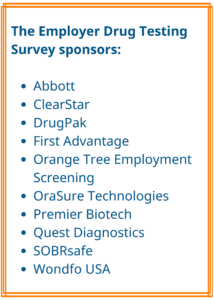
by CCG Staff
Marijuana in the Workplace Tops Employers’ Concerns
This information is provided for educational purposes only. Reader retains full responsibility for the use of the information contained herein.
Employers are still concerned about the legalization of marijuana and how it affects the workplace, according to a new survey conducted by the Current Consulting Group. As a result, the future of drug testing for marijuana remains somewhat uncertain. When asked: “What is your company’s position on testing for marijuana?”:
- 77% said, “We test and plan to continue testing for marijuana.”
- 9% said, “We are not sure what to do about testing for marijuana.”
- 9% said, “We have dropped marijuana from our drug-test panel.”
- 5% said, “We are considering dropping marijuana from our drug-test panel in the next 12 months.”
The top reasons why employers say they would drop marijuana from their drug-test panel include:
- “It makes it difficult to hire new people” (50%),
- “We are concerned about lawsuits/legal liability if we test for marijuana” (40%) (Note: in a separate question, 5% said they had already faced legal challenges for testing for marijuana), and
- “What employees do on their own time is not our company’s business” (10%).
Another big reason why testing for marijuana may be in trouble is that many employers actually believe conditions in their workplaces improved or were unchanged after they discontinued testing for cannabis:
- 63% said they have seen no change in overall work performance since dropping marijuana.
- 38% said it has been easier to find new people to hire.
- 17% said employee morale has improved.
- 17% said productivity has increased.
However, when asked how concerned they were about the impact of marijuana use on various aspects of doing business:
- 76% said they were concerned or very concerned about safety.
- 68% said they were concerned or very concerned about finding qualified employees.
- 67% were concerned or very concerned about.
- 59% were concerned or very concerned about the company’s reputation.
- 59% were concerned or very concerned about turnover.
- 58% were concerned or very concerned about absenteeism.
- 54% were concerned or very concerned about employee morale.
“What was most disturbing about employers’ opinions about testing for marijuana,” said Bill Current, President and Founder of the Current Consulting Group, “is that nearly 33% of providers said in five years employers will no longer test for marijuana while 36% said employers will still test for marijuana but it will be a lot fewer. Only 20% predicted that just as many employers as now will still be testing for marijuana in the near future.”
Also in the industry survey, when providers were asked if employers who drop marijuana from their drug-test panel will eventually reinstate it, 50% said “probably not.” Only 10% said “most if not all will” add marijuana back into their panel.
When asked “What are the biggest challenges to performing drug tests?” 39% said “marijuana legalization.”
The Current Consulting Group (CCG), now in its 26th year of serving the drug testing industry, conducts two surveys each year. Earlier in 2023, CCG, the #1 recognized brand in drug testing consulting, released the results of its 25th Annual Drug Testing Industry Survey at the annual National Drug and Alcohol Screening Association (NDASA) conference. The Employer Drug Testing Survey was released in October at the annual conference of the Substance Abuse Program Administrators Association (SAPAA).
“We know that substance abuse is on the rise and that drug testing and background screens are more important than ever,” Current said. “Just over 40% of survey respondents said positive drug test results, overall, are up compared to last year.”
© 2010-2023 The Current Consulting Group, LLC – No portion of this article may be reproduced, retransmitted, posted on a website, or used in any manner without the written consent of the Current Consulting Group, LLC. When permission is granted to reproduce this article in any way, full attribution to the author and copyright holder is required.


